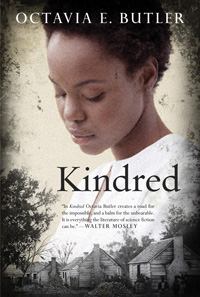“Kindred” by Octavia Butler

You know those books or authors that are on your radar for years and then you finally get around to them?
(I suppose this is just a variant of the books/authors on our radar whose books we bought and then just let sit on the shelf for years. Oh, wait, I’m the only one who does that, right?)
Anyway, Octavia Butler is one of those authors for me, and so I chose Kindred for one of my book groups. I was kind of afraid of it. To me, the description sounded like a time-travel version of Beloved, one of the most powerful novels I’ve read, but also one of the most harrowing. But I chose the book, and read the book, and am here on the other side to say: damn glad I did. This is great stuff.
Dana is a black woman in 1976 who is suddenly pulled back in time to early-1800’s Maryland. She has a strange connection to a red-haired boy that unspools in a time-traveling back-and-forth between the centuries. Most of the book is set in the 1800’s, one of the reasons this nearly 30-year-old “science fiction” book doesn’t feel dated, except when it’s deliberately TRYING to be dated, which Butler does a fabulous job writing, because she clearly did a boat-load of research. But even most of the mundane details of Dana’s life in the 70’s don’t jar, which makes the shift to the past that much more jarring. One exception: when Dana wants to find an example of what a pass letter for a slave might look like, none of the books in her house have that. I found one in a few seconds.
This book is typically shelved in science fiction/fantasy and because it’s historical time travel, is more often referred to as science fiction. This doesn’t quite fit: there’s no science to Dana’s time travel. Butler leaves that deliberately vague. Really, it belongs in literature because it’s a beautifully crafted, suspenseful novel.
Dana cannot predict when she’ll be drawn back in time. Time passes differently in the past than in her present. Like all time travellers, she has to carefully weigh her actions in the past for their potential consequences in the future. Dana is a strong, smart, heroine. While I began the book with trepidation, it soon had me so in its grip that I raced through it. And, like the best books, it has me thinking about it after I’m done, mulling over the questions that Butler poses so tantalizingly, and in such complex ways.
A note on the covers. The image at the top is of the most recent US edition. Part of my trepidation about the book stemmed from the more haunting image on an earlier edition:

Yet after reading the book, I see the newest edition as the romanticized nonsense that it is. The older cover is a much better fit for the story, even as I can recognize that the newer one is more reader friendly. Given that this book has lasted, I’ll grudgingly allow that anything that draws a reader into it to evaluated it on her own terms is a good thing. But, having read the book, the older cover has more integrity.
Another characteristic of a great book, for me, is its ability to provoke me to follow up on ideas in it, such as a recent piece in the Guardian, “Why Can’t Women Time Travel?” and sci-fi author Charles Stross’ response on his blog, “Time Tourism” in which he refers to Kindred by link via the phrase in bold:
Time travel tourist yarns that describe the depths of our historical depravity have to deal with the essential problem that their settings can be no less sexist than our past. And there are time travel novels about women that tackle this problem head-on, but they tend to make for grim reading.
Kindred is at times grim. Yet it’s also utterly involving and thought provoking. So to dismiss it as grim is to be afraid of it, as I was for many years, and thus to miss out on a great book. Be not afraid. If Dana can make the jump, so can you.